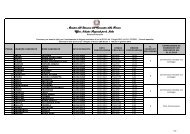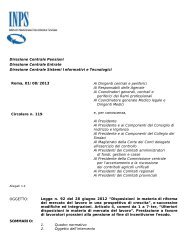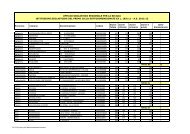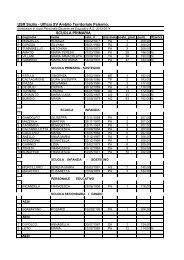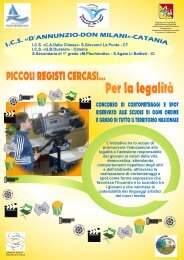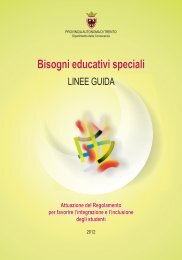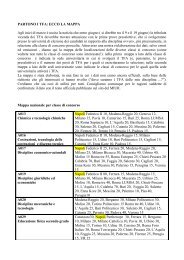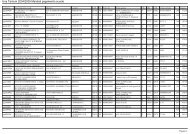Analisi - knowledge management case studies - Aetnanet
Analisi - knowledge management case studies - Aetnanet
Analisi - knowledge management case studies - Aetnanet
Create successful ePaper yourself
Turn your PDF publications into a flip-book with our unique Google optimized e-Paper software.
Design and implementation<br />
In order to reach the organisational goals the following instrumentation of the <strong>knowledge</strong><br />
<strong>management</strong> system (i.e. <strong>knowledge</strong> infrastructure) was designed and implemented. The<br />
following categories will be discerned: leadership & <strong>management</strong>, organisational structure &<br />
HRM, processes and Information & communication technology.<br />
Leadership and Management<br />
No mandate from the top<br />
At the moment the New Ways of Working group doesn’t get any funding from the top, they<br />
have to market their services like any other consultant and find sponsoring Operating Units<br />
for their R&D efforts. In the beginning New Ways of Working received a limited amount of<br />
seed money from the top to develop and present their ideas on <strong>knowledge</strong> <strong>management</strong> and<br />
the potential it might have for Shell. Following this initial stage they got R&D funds, coming<br />
from a variety of Operating Units who were willing to invest in this new initiative in order to<br />
enable more and better <strong>knowledge</strong> sharing. With respect to consultancy activities, New Ways<br />
of Working get paid their hourly rates by customers in Operating Units asking services from<br />
this team, e.g. all the Production Chemists in the Exploration and Production Operating Units<br />
who want New Ways of Working to help them build a common interest network on<br />
Production Chemistry for them.<br />
Bottom-up<br />
New Ways of Working started (see also: Organisational structure and HRM<br />
Common Interest Networks<br />
Shell has around 60 common interest networks worldwide and is in the process of combining<br />
them into less, but larger communities with a broader scope. Each network covers a certain<br />
related set of topics, part of their discipline. For example, the drilling engineers part of the<br />
wells network are discussing about drilling ‘ultra slim’ holes and the people who purchase<br />
drilling related equipment discuss their topics in their part within the same network. The<br />
people joining a network are sometimes part of the core network and sometimes in the<br />
periphery of the network and jump in whenever something that draws their attention comes<br />
by. In order to ensure that the community remains active a moderator provides support. In<br />
many <strong>case</strong>s a moderator moderates between 1 – 3 days each week. The most successful<br />
larger networks have a fulltime moderator, funded by the Operating Units with a major<br />
interest in the business processes discussed in the network. The moderator is:<br />
• the ambassador and marketeer of the community;<br />
• the community builder;<br />
• responsible for creating and maintaining momentum in the community;<br />
• managing, sometimes even editing the content;<br />
• ensures questions get answered;<br />
• and requests (and chases) for contributions.<br />
The best expert is usually not the best moderator: other people may stop contributing if a<br />
moderator keeps adding comments to contributions from others.<br />
In larger, globally operating, networks three other roles are identified to support the<br />
community: a Subject Focal Point, moderating a part of the network, Local Coordinator<br />
energising all the members in his/her Operating Unit and a Global Coordinator acting as<br />
chairman and energiser for the total community. For an explanation of their necessity and<br />
their tasks is refered to the section called: Errore. L'autoriferimento non è valido per un<br />
segnalibro. - Implementing new organisational structure slowly.<br />
Appraisal system<br />
People do get recognised in a community by their contributions and by exposing their<br />
<strong>knowledge</strong>. This can occasionally contribute to financial rewards: a promotion can be<br />
CIBIT 34<br />
analisi-KM <strong>case</strong> <strong>studies</strong>.doc - 25/5/99




